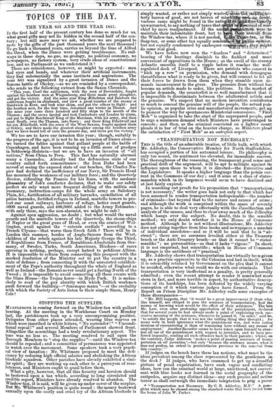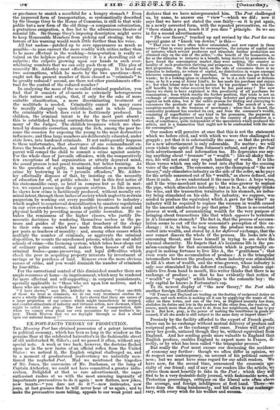"TRANSPORTATION NOT NECESSARY.'"
TB's is the title of an admirable treatise, of little bulk, with which Mr. Adderley, the Conservative Member for North Staffordshire, has occupied a portion of his autumnal leisure. Its philosophy is only too sound, its sentiment too elevated, for immediate success. The thoroughness of the reasoning, the transparent good sense and practical drift.of the argument, will be apt to militate against its influence upon those to whom it is directed—the Eitecutive and the Legislature. It speaks a higher language than the patois cur- rent in the Commons of our day ; and it aims at a class of states- manship which in its largeness would seem to have declined and at last fairly expired. In searching out proofs for his proposition that "transportation) is not necessary," the writer goes back not only to that which has been assumed to render transportation indispensable—the number of criminals—but beyond that to the nature and causes of crime; and although the work is comprised within the space of seventy pages, he is able to deal very effectually with the classification and analysis of the causes, and thus to clear away much of the difficulty which hangs over the subject. No doubt, this is the sensible method"; we only doubt whether it is the House of Commons method. Although he is not without illustrations, Mr. Adderley does not string together from blue books and newspapers a number of individual aneedotes—and so it will be said that he is "ab- stract"; there are no sarcasms levelled either at the Treasury bench or the Anti-Treasury bench—so that it cannot be " states- manlike " ; no personalities—so that it lacks "vigour." In short, it is not empirical, but scientific ; which in House of Commons language is the antithesis of "practical."
Mr. Adderley shows that transportation has virtually been given up, as a practice oppressive to the Colonies and bad in itself, while it is ostensibly retained by Government on the plea that it cannot he avoided, otherwise what could we do with out criminals. That transportation is very ineffectual as a penalty, is pretty generally admitted ; even the recent attempt to render it somewhat more stern in fact, and more terrible in aspect, by authoritative descrip- tions of its hardships, has been defeated by the widely varying conception of it which various judges have formed. From the Report on Prison Discipline Mr. Adderley culls some examples of these discrepancies-
" Mr. Hill suggests, that it would be a great improvement if those who, like himself, are obliged to pass the sentence of transportation, had the means of knowing -what would be the effect of their sentences.' The late Mr. Law, even after professing approbation of the punishment, declared that for several years he had always made a point of explaining each suc- cessive meaning of the sentence, whenever he passed it, in order,' said he, to satisfy the people that it was not the trifling thing they thought ; for many were in total Ignorance what the punishment was, and were rather desirous of encountering it than of remaining here without any means of employment.' Another Recorder seems to have taken upon himself to aban- don all use of the punishment with respect to juveniles, and to have pre- ferred impunity, sending all such offenders back to their parents ; whilst, on the contrary, judge Alderson makes a point of passing sentence of trata- portation on all juveniles,'—but only because the sentence means, what it does not profess, an ordeal in penitentiaries previous to the removal from this country.' " If judges on the bench have these lax notions, what must be the ideas prevalent among the class represented by the gentlemen in the dock ? If judges, who have crammed to get up a dreadful- picture of penal expatriation, have such vague and conflicting ideas' how can the criminal world at large, unlettered, not conver- sant with blue books nor learned in the social geography of the antipodes, acquire any distinct ideas—any such precise and active terror as shall outweigh the immediate temptation to prig a purse • "Transportation not Necessary. By C. B. Adderley, M.P." A pam- phlet which may be classed among the standard works that have issued from the house of John W. Parker. or perchance to snatch a mouthful for a hungry stomach ? Even the improved form of transportation, so systematically described by Sir George Grey to the Rouse of Commons, is still to that wide public but a new form of the old thing—a companion colonization, a gratuitous emigration, a free list to the adventurous theatre of eolonial life. Sir George Grey's imposing description might serve to keep Honourable Members from picking and stealing, but the terrors of his warning would reach little further than his voice.
All but useless—patched up to save appearances as much as possible—to pass current the more readily with critics rather than to be more effectual in the working—transportation is really re- tained on the helpless plea of necessity : it is a shovelling out of culprits ; the culprits growing upon our hands in such over- whelming numbers that we can only push them off. This plea of necessity Mr. Adderley most effectually grapples. It is based on two assumptions, which he meets by the two questions—first, ought not the present number of those classed as " criminals " to be greatly reduced ? second, are there not other punishments effec- tual for the control of the reduced number?
In analyzing the mass of the so-called criminal population, you find that it consists of elements so extremely heterogeneous in their nature and origin, that, if only for the sake of more suitable classification, a more discriminating treatment of the multitude is needed. Criminality cannot in many cases be morally charged upon individuals, and in whole classes the criminality which does exist is factitiously produced. In children, the criminal intent is for the most part absent : this is established beyond contradiction by the concurrent testi- mony of the Judges. The childish trespasses which are chas- tened by domestic correction among the rich, among the poor be- come the occasion for exposing the young to the most destructive influences ; and thus large numbers are deliberately educated, under state laws, into hardened criminals. It not unfrequently happens to these unfortunates, that observance of one commandment en- forces the breach of another, and that obedience to the criminal parent will compel the child to commit a crime against society. For the whole class of juvenile offenders, with the comparatively few exceptions of bad organization or utterly depraved mind, the sound process is not penal treatment, but better training. As to the question of eq.uity, in making education a premium to crime by bestowing it on "juvenile offenders," Mr. Adder- ley effectually disposes of that, by insisting on the necessity of education for all, at public schools : but in this first notice of his statesmanlike essay, so brief in compass but so full in mat- ter, we cannot pause upon the separate sections. In like manner, he shows how crime is factitiously produced, without morally cri- minal intent, through those inches of-societywhich neglectto restrain pauperism by working out every possible incentive to industry ; which neglect to countervail demoralization by sanatory regulations in our over-crowded towns ; which neglect to promote moral and physical health by providing means of public recreation. He re- bukes the remissness of the higher classes, who justify De- mocratic doctrines by rendering themselves useless as the pa- trons and guides of the poor ; that treachery of the clergy to their own cause which has made them abandon their pro- per posts as teachers of morality : and, among other causes which multiply the number of criminals, or aggravate the criminal disposition, he counts the unreformed prisons, which are real adult schools of crime—the licensing system, which takes beer-shops out of ordinary, police control, and makes them houses of call for criminal trades—game-preserving, and legal difficulties which check the poor in acquiring property interests by investment of savings or by purchase of land. Remove even the more obvious causes of crime, and you would diminish the number of criminals by four-fifths.
For the correctional control of this diminished number there are ample resources at home—in imprisonment, which may be rendered far more effectual and self-supporting ; in corporal punishments, specially applicable to "those who act upon low motives, and to those who are sensitive to disgrace."
"I have shown," says Mr. Adderley in conclusion, "that one-fifth of those we treat as criminals, we in our very treatment confess de- serve a wholly different estimation. I have shown that there are causes of a large proportion of our crimes which might immediately be stopped, and counter-stimulants of industry and virtuous action, now dormant, which might be called into play. The last defence of transportation fails when we cannot even plead our own necessities for our brother's in- jury. Thank -Heaven that we see daylight through so foul a cloud upon our national honour !"



























 Previous page
Previous page